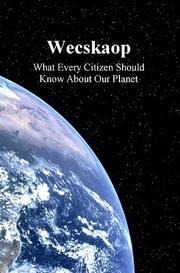Check nearby libraries
Buy this book

OVERVIEW: This book surveys multiple topics, all relating to population and carrying capacity issues. For example: "Why Brazil's ten percent conservation goals are not enough," and an assortment of humanitarian, biospheric, and civilizational disasters that current rates of population growth portend. --------- Other examples include international affairs, poverty, national security, and failed states; climate, Biosphere II, and Roger Revelle; Beyond Six Billion, keystone species, and self-amplifying feedback loops; tipping points, unintended consequences, and unwarranted assumptions; permafrost, global warming, and "the Paleolithic, the Neolithic, and now."
Check nearby libraries
Buy this book

Subjects
population, ecology, demographics, carrying capacities, limiting factors, climb-and-collapse, exponential mathematics, J-curves, climate, tipping points, world population levels, conservationPlaces
China, the Middle East, Madison Square Garden, Rome, Mediterranean basin, Alaska, Madagascar, Canada, New England, California, Arizona, Pacific Ocean, Venus, Mumbai, Tokyo, Cairo, Liberia, Los Angeles, NYC, Rio de Janiero, Mars, Australia, New Zealand, Greenland, Aral Sea, Sri Lanka, Brazil, Costa Rica, India, Pakistan, Bangladesh, Chad, Cameroon, Lagos, Davos, tropics, Easter Island, New OrleansShowing 1 featured edition. View all 1 editions?
| Edition | Availability |
|---|---|
|
1
Wecskaop: What Every Citizen Should Know About Our Planet
2007, First Edition, M. Arman Publishing
Paperback
- Second edition, 2008
0933078188 9780933078185
|
aaaa
Libraries near you:
WorldCat
|
Book Details
First Sentence
"Despite an unwarranted complacency among many, humanity's central problems today include, among other things, (a) the impending arrival of our 7th, 8th, and 9th billions by mid-century, along with (b) the extreme levels of overpopulation and the environmental impacts that we already exhibit. As a result, a continuation of today's demographic tidal wave may constitute the greatest single risk that our species has ever undertaken."
Table of Contents
Edition Notes
A 2010 third edition of this title has now been published with notes and TOC also posted on openlibrary.com
The Physical Object
ID Numbers
Work Description
Population calamities in seemingly "empty" environments? This is a book about earth's carrying capacity for an industrialized humanity and climb-and-collapse population calamities in real-world conditions. Beginning with a world population of two billion in 1930, our newest numbers include seven billion in 2011 (FIVE additional billions in a single human lifetime), with still more billions (numbers eight and nine) on-track to arrive by mid-century. Given the compelling evidence for the impacts and damage that our species is already inflicting (when only half of us are industrialized), our current trajectories already exhibit late-phase exponential conditions.
Sample chapters include "Nine assumptions that invite calamity," "The paleolithic, the neolithic, and now," and "Carrying capacity and limiting factors," while sample section topics include "the lungs of the world," "stoplights and twisting mountain roads," "the wheels are coming off out there," "tipping points," and "unintended consequences."
Community Reviews (0)
Feedback?| August 28, 2010 | Edited by 74.243.15.4 | modified the preview |
| August 28, 2010 | Edited by 74.243.15.4 | Edited without comment. |
| May 10, 2010 | Edited by 74.243.9.41 | Edited without comment. |
| May 10, 2010 | Edited by 74.243.9.41 | Edited without comment. |
| December 11, 2009 | Created by WorkBot | add works page |










